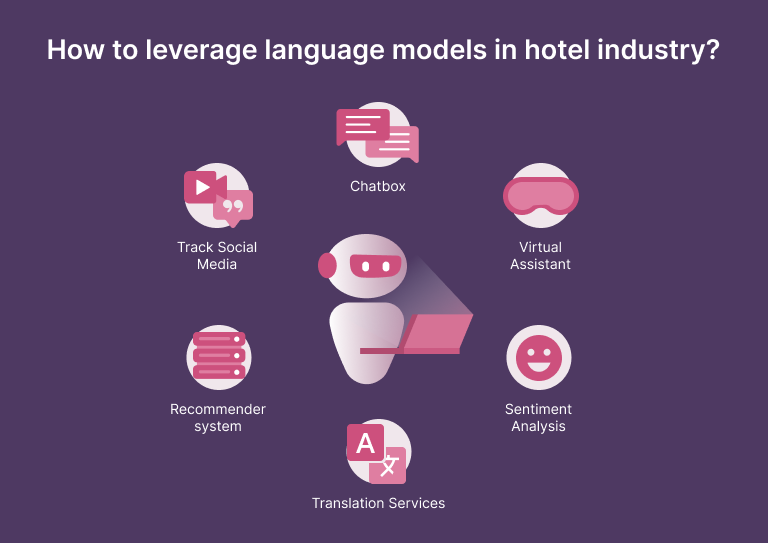The technologies used by the hotel industry have advanced over the years. One of the most revolutionary technologies which have recently gained momentum in the hotel industry is Open Source LLM(Large Language Models).
Open source LLM is a combination of AI (artificial intelligence) and ML (machine learning) that holds the power to shape the future of the hotel industry. In addition, it can help hoteliers in providing their guests with a memorable stay experience.
In this article, let’s explore which type of Large Language Model is better for the hotel industry and how to practically use it for improving the guest experience.
What is the Large Language Model?
A kind of Generative AI (GenAI) trained on large codes and texts is called Large language models (LLMs). It can generate human like text, translate languages, answer questions, and perform various other tasks.
There are two types of LLMS: Open Source and Proprietary.
Open Source LLMs are models released under a license. One of the most well-known Open Source language models is GPT-4 (Generative Pre-trained Transformer 3), developed by OpenAI.
In contrast, Proprietary Sources are models owned by a specific company.
Which LLM is Better for Hotel Industry: Open Source LLM or Proprietary?
Various factors can help us decide which model works better for the hotel industry. So let’s discuss and find out which LLM is more suitable for the hospitality sector.
Customization
Open Source LLM is released under a license which implies that users can easily access, alter, distribute, and commercialize the model. It will allow hoteliers to customize the model as per their needs.
On the other hand, Proprietary sources are owned by a specific company. So, its use and distribution are governed by the restricted license and offer limited customization options.
Transparency
Open Source LLM is transparent in its working, algorithms, and codes, enabling hoteliers to understand how LLM works.
In contrast, Proprietary Source lacks transparency because its codes are not accessible to users.
Cost Effective
Open Source LLM is an affordable type of LLM. Various small and medium hotel owners with fixed budgets prefer Open Source LLM over Proprietary solutions.
Whereas Proprietary sources are expensive because private organizations develop them.
After discussing the difference between Open Source and Proprietary Sources, we can infer that Open Source LLMs are more beneficial than Proprietary sources for the hotel industry.

How to use Open Source LLM in Hotel Industry?
The use of Open Source LLM for various tasks, such as ChatGPT for hotel management is increasing day by day. Hoteliers have started using various types of Open source LLMs in various ways to improve guest experience.
Let’s discuss a few of the many ways.
Chatbox and Virtual Assistant
There are various benefits of Chatbox and Virtual Assistants in the hotel industry. They help in providing 24/7 support and interaction facility to guests. They help hotels provide instant responses to their guest’s queries or requests. Open Source LLM can power this Chatbox and Virtual Assistant.
These AI powered assistants will help you provide personalized services to your guests. Moreover, they can guide your guests through their booking process and answer all their questions regarding services and amenities.
Sentiment Analysis
You can train Open Source LLM to perform sentiment analysis on textual data. Utilize these models to analyze guests’ feedback and reviews to gain insight into guests’ satisfaction.
Through this, you can understand your guest’s positive or negative sentiments. Understanding your guest’s feedback will help you identify and work on areas of improvement and enhance guests’ experience.
Translation Services
Open Source LLM can facilitate multilingual communication between staff and guests. It helps hoteliers integrate language translation capabilities into their websites and mobile apps. It will help hoteliers remove the language barrier between themselves and their guests and help them provide their guests with a personalized stay.
Guests can receive information, communicate their needs, and make requests in their preferred languages. It further leads to improved customer satisfaction.
Recommender System
Open Source LLM stores information and processes it as per our needs. Therefore hotel owners can use it to analyze guests’ preferences and their historical data. This analysis will provide hoteliers with their guest’s preference reports, which they can use to provide their guests with customized services.
By understanding a guest’s past behavior, such as their previous bookings, dining choices, or activity choices, language models can suggest tailored loyalty programs, offers, promotions, or experiences that hotels can use to create a personalized and memorable stay for guests.
Track Social Media
Open Source LLM can track and monitor your social media platforms for mentions, tags, or reviews related to the hotel industry.
Through monitoring current hotel market news and media conversations, hotels can gain valuable insights regarding guest experience. This approach helps hoteliers stay updated with all hotel developments and technologies. So that they can provide their guests with a memorable stay.
Conclusion
From creating and powering chatbots and virtual assistants and tracking social media to analyzing customer behavior and sentiments and managing translations, Open Source LLM performs all these tasks efficiently.
It helps hoteliers ease their management process. In addition, it will also aid in providing guests with the best services.
While Open Source LLM is a powerful tool for improving the guest experience, it requires careful application.
Get In Touch
I am now ending this article. From this article, I hope you got an idea of how you can leverage Open source Large Language models for your hotel.
If you are a hotelier who wants to launch his hotel website, then try QloApps. It is a free hotel reservation system. Also, please share your thoughts and queries on our QloApps forum.

Be the first to comment.